1. history of European colonization introduction
1/68
Earn XP
Description and Tags
- definitions - causes - consequences - historiography
Name | Mastery | Learn | Test | Matching | Spaced |
|---|
No study sessions yet.
69 Terms
what percentage of the planet surface did the colonizing?
1,6%
which areas have never been colonized?
Abyssinia (apart from 1936-1944)
Liberia
most of Arabian Peninsula
Afghanistan (attacked by Brits but never succeeded)
Thailand
Parts of China
Japan
Korea
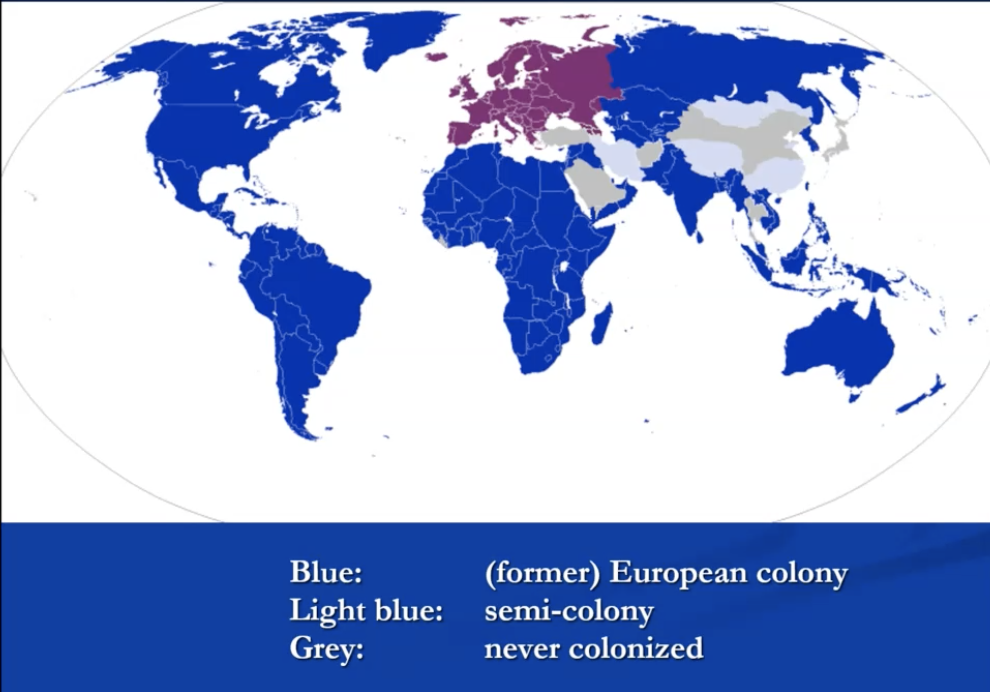
expansion
people expanding their territories to other regions
not always colonization: ex exodus (no center remains), emigration (integration into existent societies ex chinatown is not a colony)
border colonization: expanding territory by moving border
colonization: naval networks, overseas settlement
exodus
a (large) group of people moving from one place to another and settles there
because of prosecution, ecological reasons,…
no controlling center remains behind (no metropole)
metropole
center of empires
geographically remote ‘mother country’/imperial center
border colonization vs colonization
colonies are part of the immediate territory of the country, they are within the new border
colonies in different parts of the worlds
ex British North-America ≠ Chinatown
colony (Jürgen Osterhammel)
a new political organization created by invasion (conquest/settlement)
alien rulers are in sustained dependence on geographically remote ‘mother country’/imperial center (metropole) which claims exclusive rights of possession of the colony = claims political power
3 elements colony (Jurgen Osterhammel)
invasion
remote mother country
exclusive rights of possession
colonialism (Jürgen Osterhammel)
relationship of domination between indigenous (or forcibly imported) majority and minority of foreign invaders
fundamental decisions affecting lives of colonized people are made and implemented by colonial rulers in pursuit of interests that are ofted defined in a distant metropolis
rejecting cultural compromises with colonized population, colonizers are convinced of own superiority and ordained mandate to rule
3 elements colonialism (Jürgen Osterhammel)
domination
distant metropolis
ordained mandate
colonies without colonization
ex only military conquest
colonization without colonies
border colonization ex colonization of Ireland
internal colonialization
ex Brazil and the hinterland
initially only coast of Brazil was only colonized => inland Brazil was colonized
Brazil also hasn’t explored all of its forests yet => there are still indiginous tribes that are being discovered for the first time
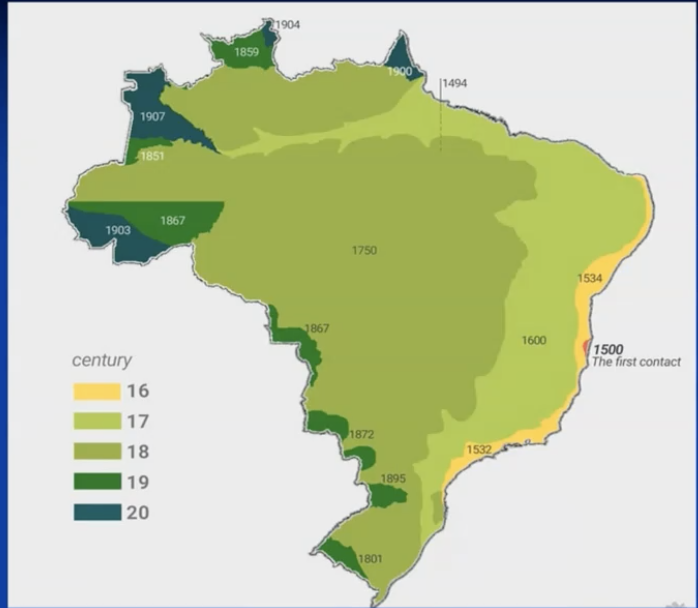
subcolonial relations
between one colony and another colony of the empire
=> colonies become colonizers themselves
different types of colonies based on:
administration and legal statuses (political): viceroyalties (British India), audiencias (spanish america), protectorates, Crown colonies (ruled directly by the crown), free states (free state congo => “on paper”), overseas provinces (French Guyana), league of nation mandates, UN trusteeship territories,…
economy and population: pure settlement colonies, plantation colonies, exploitation colonies, trading settlements, maritime enclaves,…
different types of empires (3)
formal empires
several ‘peripheries’ are subordinated to the center
ex Portugal, Spain, Dutch Republic, France, Britain,…
semi-empires or non-empires
colonial powers without empires
ex. Spain post 1820 (lost colonies in Latin-America), Belgium (only had 1 colony)
informal empires
pursue interests beyond acquisition of territory
regions remain independent countries
ex china, 19th-century Britain in Latin America,…
imperialism
all forces and activities contributing to the construction and maintenance of empires
difference colonialism and imperialism
imperialism is more comprehensive
colonialism is a special manifestation of imperialism
no absolute difference (can be used interchangeably)
ex border colonization (Roman Empire, Tatar empire, Austrian Habsburg Empire) is not colonialism but is imperialism
largest empire that ever existed
the tatar (mongol) empire
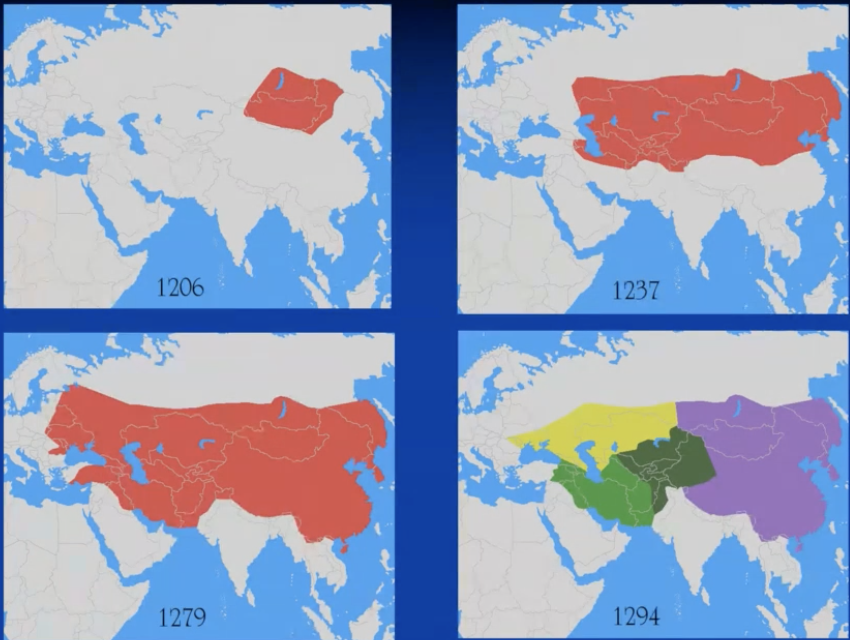
differences imperialism vs colonization
relationship metropolis and conquered areas
colonial empire: metropole ruled colonies
Roman Empire, Mogul empire,…: people from colonies could also become emperors,…
—> ex non-roman roman emperors: Trajan (spain), Hadrian (spain), Septimus Severus (libya), philip the arab (syria)
—> the Tatars assimilation: conversion from Tengrism and Buddhism to islam (as if Britain would have become for example hindu), Kublai Khan grandson of Genghis Khan and first emperor of Yuan dynasty of China)
border colonization vs European (overseas) colonial empires
ex Tatar Empire, Russian Empire (greatly expanded their borders)
plethora of empires in world history
China under Han, Jin, Tang, Yuan, Ming & Qing, Precolonial empires in Western Africa, the Inca Empire, The Ottoman Empire,…
How could the expansion of the Russian empire though it is seen as border colonization still be argued to be colonization?
the representation and imagination of non-western people (the people in the caucasus) showed a lot of denigration and came very close to being just like orientalism
in soviet times, the bolsheviks created a federation and gave some autonomy to all ethnic groups (embracing diversity)=> also typical European colonization = labelling people in ethnic terms by categorizing them into groups
colonization vs European colonization
not subordinate to metropole
Greek colonies, Phoenician colonies,…
ancient past or present-day
ex Israel-Palestine,…
scale of european colonization
portuguese settlements, spanish colonization, dutch colonization, Britisch Empire…
over different continents
voyages
European: Christopher columbus (late 15th century), James Cook (late 18th century)
other: Ibn Battuta (middle 14th century), Ma Huan worked for Cheng-ho (beginning 14th century, biggest fleet the world has ever seen, not typical voyage), Marco Polo (just a traveller)
difference: mostly within one cultural sphere (muslim countries mostly), no permanent transformation (no settlement,…)
Rosalind Franklin
first to discover composition of DNA
British
rare that she hasn’t been forgotten (just like colonization)
when did European colonization start? (thinkers)
early starters: David Landes and Immanuel Wallerstein
critics: Kenneth Pomeranz and John Darwin
compromises: David abernethy and Anthony Hopkins
David Landes
book the wealth and poverty of nations (1998)
“for the last thousand years, Europe has been the prime mover of development and modernity”
Immanuel Wallerstein
16th century: rise of one single capitalist world economy
North-western Europe: core (prime mover)
rest of europe: semi-periphery (provided corn, food, coal)
rest of the world: periphery
book the modern world-system (1974-1989), book world system analysis
critique book: there wasn’t just one single core in these centuries (ex also ottoman empire, china)
Kenneth Pomeranz
book The Great Divergence
core areas in 18th century Old World
NW Europe and Chinese and Japanese cores
many parallels (between core areas)
life expectancy, consumption, markets,…
Asian GNP vs European GNP
—> 1750: 130% (SE Asia wealthier) - 1800: 100% (start divergence) - 1870: 50%
economy and development were much more similar than previous historians had realised
divergence in early 19th century
European shortage of energy:
timber —> coal —> steam —> industrial revolution
East asian hinterlands boomed
—> prevented need for innovation
John Darwin
“before 1800 what really stood out was not the sharp economic contrast between Europe and Asia, but on the contrary, a Eurasian world of surprising resemblances”
book After Tamerland. the rise and fall of global empires 1400-2000 (2007)
David abernethy:
5 phases
expansion (1415-1773)
1415 Portugal conguered Ceuta = first time European country colonized overseas country
first decolonization (1775-1824)
second colonization (1824-1912)
consolidation (1914-1939)
between start first and second world war
second decolonization (1940-1980)
actually still going on
book the dynamics of global dominance: European overseas empires 1914-1980 (2000)
Anthony Hopkins
4 stages
archaic globalised networks
proto-globalisation (1600-1800)
high imperialism
postcolonial era
book globalization in World history (2002)
causes of European colonization
geography
technology
economy
politics
culture
irrationality
combination
beyond europe
geography as a cause for European colonization
Europe peninsula surrounded by water (good locations)
particularities: Portugal (closest to atlantic) - Spain (between atlantic and mediterranean) - Dutch republic - England
protection from steppe imperialism (couldn’t reach them because there were countries in between that stopped invaders)
vs. Eastern Europe (tatars, ottomans and Russians)
vs India (afghans, persians and turkic people)
vs China (tatars and Manchu)
narrowness of the atlantic ocean (much closer from europe to america than fex china to america)
need to circumvent Africa for trade with India
new world “discovered” by europeans (ex america and africa explored)
Jared Diamond
actually geographer
contrasts Eurasia to other continents (why did they become the colonizers and not the others)
Eurasia: long east-west distances (more homgeneity and exchange)
vs different climates in africa
vs different latitudes in america
benefits
more exchange and wheat varieties
more domesticated animal species
food supply —> dense populations —> division of labour
book guns germs and steel: a short history of everybody for the last 13000 years, collapse,…
technology as a cause for European colonization
early inventions
eyeglasses (doubled the working life because people loose sight at older age), mechanical clock (discipline,…), printing (propaganda,…), …
communication and transportation (second wave colonization)
shipbuilding (development of caravel, galleon, steamship,…)
science and medicine (second wave)
vitamin C (scurvy due to lack of vitamin), Quinine (malaria)
diseases were reason why Europe initially didn’t penetrate Africa => medicine made this possible
military superiority (second wave)
gunpowder, maxim guns
Tonio andrade
book the gunpowder age
emphasises European and Chinese similarity just as Pomeranz
long-standing chinese superiority
song developed gunpowder weapons
ming first gunpowder empire
Europe classic gun (as late as) in the 14th century
China prevailed in all early conflicts
great military divergence: 1760-1840
Europe increasingly innovated
ships, renaissance fortress, industrial revolution
China lost position (no incentives for innovation)
peace under Ming and High Qing
dysfunctional state under late Qing
economy as a cause of European colonization
capitalism (almost like feedback mechanism)
property rights
competition and profit motive
capital accumulation
industrial revolution
need for raw materials and resources
need for markets and investments
social transformation and population pressure
great diversity
ex not all business milieus enthusiastic
ex not all colonization economically motivated
John Hobson
“imperialism is the endeavour of the great controllers of industry to broaden the channel for the flow of their surplus wealth by seeking foreign markets and foreign investments to take off the goods and capital they cannot sell or use at home”
book Imperialism: a study (1902)
Vladimir Lenin
critic of imperialism
“imperialism is capitalism in that stage of development in which the domination of monopolies and finance capital has taken shape; in which the export of capital has acquired pronounced importance; in which the division of the world by the international trusts has begun and in which the partition of all the territory of the earth by the greatest capitalist countries has been completed”
book imperialism: the highest stage of capitalism (1916-17)
gentlemanly capitalism
british imperialism driven by the business interests of the city of london
PJ Cain and Hopkins: British imperialism (1993)
politics as a cause of european colonization
competition
16th c Portugal vs Spain
17th c Dutch republic vs Spain, then England (won)
18th c Britain vs France (both in europe and colonies)
19th c new nations (germany, Italy, Belgium)
power
prestige and nationalism
geopolitics and pre-emptive strikes
lightning rod for domestic problems
role of individuals
Ronald Robinson & John Gallagher on imperialism in Africa
political and strategic
reluctant because of the activities of others
to secure against instability
peripheral and excentric
politicians rather than masses
local administrators rather than metropole politicians
importance of local resistance that prompted occupation
Africa and The Victorians
culture as a cause of European colonization
mentality: feelings of superiority
science: cult of progress (europeans made many inventions => further expansion, industrial revolution,…)
race: social darwinism and united white service
ideology: civilizing mission
moral: abolitionism and humanitarianism
religion: missionary revival
Max Weber
advocate cultural causes colonization
father of social sciences
wrote “die protestantische ethik und des “geist” des kapitalismus”
active and rationalizing mentality are unique to European protestants
bureacracy, legal state, science, capitalism, property, freedom, discipline, individual initiative => competition, capitalist economy,…
european protestantism
vs confucianism (China): inactive => failed to turn their inventions (printing,…) into a superiority, capitalize them
vs islam: irrational => more active but fex took their religion to literally and didn’t analyze and discuss it enough (christianity is base for philosophy)
vs hinduism: inactive & irrational
Rudyard Kipling
Bombay 1865 + 1936
The man who would be King (1888), the jungle book (1894) and Kim (1901)
1907 nobel prize in literature
lived in British india => books were about British colonization,…
also wrote poems => one of them became key represenatation of feeling of “white superiority”

irrationality as cause of european colonization Joseph Schumpeter:
colonialism is irrational in economic terms (actually not true => europe made lots of profits)
drain of resources from development
military adventures without meaningful economic return
social and psychological explanation (if irrational)
objectless expansion: behaviour learned from other nations and institutionalized by a “warrior” class
atavistic (tendency of species to return to ancestors features (ex tailbone that comes from forefathers) => tendency to fight/compete) and anachronistic
vs modernity: cosmopolitan and peaceful
book: the sociology of imperialism (1919): after collapse habsburg empire, lived in time of decline European imperialism
Austrian early 20th century
irrationality as cause of european colonization Bernard Porter:
book: the absent-minded Imperialists: empire, society and culture in Britain (2005)
imperialism not driven by ratio => British empire created by series of incidences
empire had far lower profile in Britain than abroad
Britain was never genuine imperial society
cf US today => many Americans little concerned about power their country has
very strange to think that british imperialism would have happened unconsciously => almost the whole world has been invaded by England
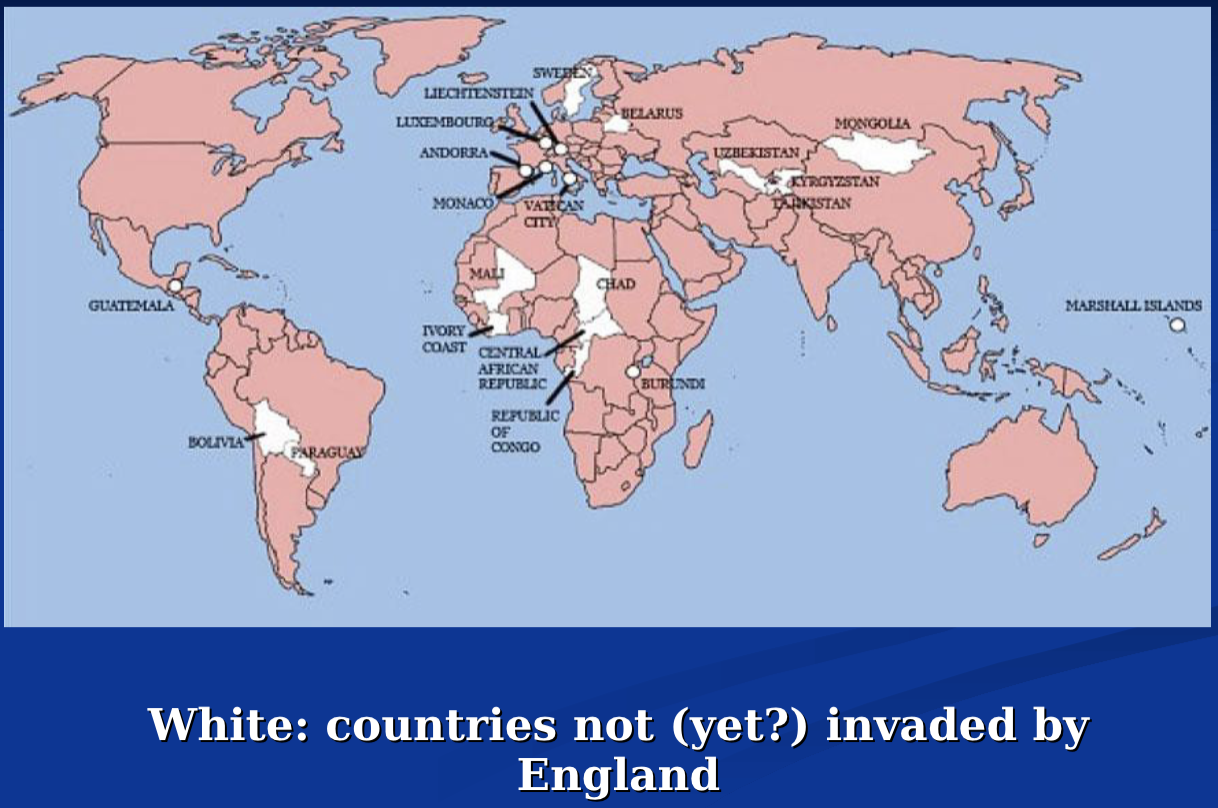
irrationality as cause of european colonization Jon Wilson:
Chaotic imperialism
book: india conquered: britain’s raj and the chaos of empire (2016)
beneath veneer of pomp and splendour, british rule in india was
anxious, fragile and fostered chaos
oscillated between paranoid paralysis and occasional moments of extreme violence
combination of causes for imperialism Niall Ferguson
current day best selling history authors
book: civilization. the west and the rest (2011)
6 care applications (features that differentiate Europe/the west from the rest of the world)
competition (economy, politics)
science (culture)
property
medicine
consumption
work ethics
combination of causes for imperialism David Abernethy:
global dominance
three sectors in the metropole
—> public (state, government), private (merchants, traders,…), private, religious (church)
will to expand (of all three secotors)
—> power, profit and proselytization (spread fate)
capacity to expand (of all three secotors)
—> monarchs (in 19th century nation states), companies, missionary bodies (well organized)
expanded independently
more financial means and people involved
flexibility: religion in America (easier), trade in Asia (easier, religion more difficult)
cross-sectoral alliances (ex spanish combined public and religious sectors while colonizing latin america, all three sectors in congo…)
combination of causes for imperialism John Darwin
English historical review (1997)
agressively interventionist ideology
free trade - utilitarianism - christianity - abolitionism => different “umbrellas”
new appetites in culture and consumption
coalition of economic forces
credits - cheap exports - migrants
maritime superiority, military superiority
David Abernethy theory applied to China
public sector
pre-eminent wealth and power
revenues from intensive agriculture
private sector
quantitative instead of qualitative growth
no need for radical shift in production technique
religious sector
confucianism supported a social order considered unique
reason to stay home, not to reach out (no conversion)
much capacity and collaboration, but no will
merchants and settlers abroad (individual chinese merchants) lacked imperial support
David Abernethy theory applied to Arab world
public sector
weak control by suprastates (caliphates)
cities: too many for competition, too small for expansion
private sector
no hierarchy of companies
arab merchants set out on their own (not supported by bigger organization)
religious sector
no ecclesiastical hierarchy (no pope,…)
cosmopolitan and highly adaptable to alien cultures
much will, but no capacity
decentralized sectors => less capable of expanding and dominating
also created overseas empires, spread their religion,… but not on the same level as Europe
James Blaut
eight eurocentric historians
“false history and bad geography”
opposes idea of geographical advantage europe
also disagrees with other causes (culture,…)
causes beyond Europe => “rise of Europe cannot be explained in the Eurocentric way”
causes beyond europe for imperialism
networks beyond Europe
older
vast
picture = Chola Empire 1030 CE
economies in Asia
CF Pomeranz & Darwin = both settled great divergence
great South-Asian empires (some even more powerful than european)
others’ impact on europe (Europe’s colonization made possible)
India as a magnet because of its wealth
ottoman expansion (Muslim world) caused search for new routes
the New World enabled further expansion
others’ technology and agency (gunpowder from China, Arab technology)
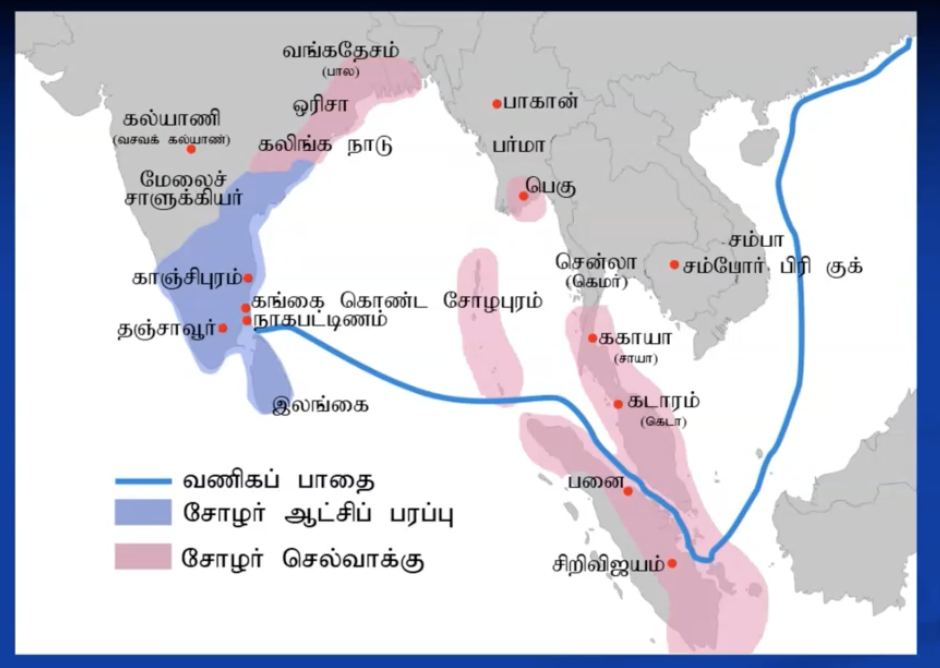
diversity among colonizers
different forms (=> types of colonies) and ideologies
evolution (long period of colonization): from pillage to development colonialism
different situations → different consequences
diversity among colonized
political: stateless, chefferies, early states, complex states (India when reached by Portugese,…)
economic: hunter-gathering, early agricultural economies, monetized economies with agrarian surplus and specialized crafts, proto-industrialization
different situations → different consequences
political consequences colonization
geography
place names => ex Easter island: discovered on Easter day (very eurocentric = naming it after European holidays, people,…), rio de janeiro (discovered in january),
borders = todays borders largely formed by Europeans => european borders average drawn in 18th century, American and Asian in 19th century and African in 20th century
national identities: Europeans created new identities by creating new empires (combining regions with different languages and cultures) => in Africa still a lot of border conflicts largely due to this
systems
homogenization of governance, reduction of forms
failed states => according to Europeans “because we left” <=> already violence during colonial era, rule that was in colonial era continues to be applies
violence
conflicts => a lot of global conflicts have colonial roots
international relations: international plans for nature protection is imposition of western views on rest of the world
economic consequences colonization
production
plantation (new crops introduced,…) and mines (taking natural resources from colonies)
infrastructure (roads, railways,…) => still today major export products of some countries were introduced by Europeans (Cocoa is more than 50% of product export from Ghana but is not original to africa => introduced from latin america by europeans)
trade: also without colonization, but
more products and exchange
different directions
colonization opens borders (‘trade follows flag’)
colonization closes borders (‘imperial preference’ = colonies should prioritize metropole)
shifting trade balance ex india —> direction of trade first from india to britain, then from britain to india = “draining of wealth”
societal consequences colonization
landownership (obvious to Europeans but new for others)
different ideas about property and land titling (imposed by europeans)
massive expropriation and rise of new elites => complete shift in societies
societal structures
marginalization and exploitation of rural communities
proletarization and urbanization (for trade,…)
demography
decline / extermination (of entire populations) => native population in America collapsed due to diseases that were introduced by colonizers
migration ex Suriname: dutch colony => South-Africans, Indians (largest ethnic group today = hindustani), natives, creoles (second largest ethnic group), Dutch, Chinese and Javanese (indonesia 3rd largest ethnic group)
cultural consequences colonization
tools of empire
communication, science, religion,…
triviality and omnipresence
language
speak english, spanish, portugese,…,
use latin script
new languages: afrikaans, creole languages in caribean
pyjamas imported
food
potatoes, spices, tea, coffee…
psychology
feelings of inferiority and superiority
racism
memory
violence, slavery, exploitation, genocide
short overview international academia of historiography of colonization
till 1950: uncritical
1950s and 1960s: pre- and anticolonial (fierce criticism or focus on precolonial situation in colonized countries)
1970s: economy, world systems (emmanuel wallerstein)
1980s: postcolonial studies (south america, critical of colonial studies and history)
edward said, gayatri spivak, homi bhabha
1990s: decolonial studies (more from anglosphere and india, there is still a colonial existence, colonial era isnt over yet)
anibal quijano, maria lugones, walter mignolo
Edward Said
—> postcolonial
1935-2003
palestinian origin
orientalism
esthetic movement (paintings,… = fascination with the east)
an (outdated) academic discipline (= examines Eastern countries, religions, languages…) => bracketing together “east”
discourse of knowledge (-E Said) => western world contrasts itself against the “east”
orient as inferior (and homogeneous) “other”
served to define Europe as superior
Arab world, indian world,… all inferior and not developping
stereotypical essentialization
Tintin in India, Aladdin…
not innocent, but highly motivated
in part to justify colonialism
Gayatri Chakravorty Spivak
—> postcolonial
1942-…
from India
subalternity (most marginalized groups in society)
subaltern: other to the other (binary thinking is wrong => there are other groups = subaltern)
oppressor —> oppressed
colonizer —> colonized
self —> other
book: can the subaltern speak? —> no, she wants to give them a voice
example of sati / suttee (widow-burning => widows follow recently deceased husbands into death by throwing themselves/being thrown on the burning pile of their husbands)
British: widespread misogynistic tradition (prime example of barbarity)
Indian elite: free will of truly Indian women (shows loyalty of the wives)
Women are spoken for and do not speak themselves (=subaltern)
Homi K. Bhabha
—> postcolonial
hybridity (opposing juxta-position colonized-colonizer)
new transcultural forms via the contact zone produced by colonization
against the idea of putity and originality, helps to overcome exotism
mimicry
imitation (forced and volunatry)
sometimes close to mockery
concept to complexify “simple” relationship colonized-colonizer
displays lack of colonial control
complicity and resistance within the colonized
==> understand colonized reactions towards colonization
Anibal quijano
1930-2018
pioneer within decolonial studies
500th anniversary of columbus reaching america
colonialidad/coloniality
coloniality of knowledge: colonial societies have systematically banished indigenous forms of knowledge from their archives and rejected the media in which this knowledge was transported
==> knowledge became and has remained colonial
colonial matrix of power (coloniality is everywhere)
economic: land, labor, finance
political: state, military
civic: christian family values
epistemic: control of knowledge and subjectivity, including christian and modern rational thought and the devaluation of non-western cosmologies and epistemologies
coloniality and modernity (two sides of the same coin)
coloniality is not opposed to modernity
coloniality does not precede modernity
Walter Mignolo
1941-…
colonialism
specific historical periods (in the past) and places of imperial domination
coloniality
the logical structure of colonial domination
Latin American colonialism ended in the 19th century, but coloniality remains until today
decoloniality
aims to counter/deconstruct coloniality
want to bring change => seen as more radical
Maria lugones
agreed with Quijano and Mignolo
coloniality of gender (already a bit in the civic aspect of the cmp)
need to include gender analysis in modernity/coloniality
intersectionality
combination of overlapping opressions (race, gender,…) = interconnection
Belgian colonial studies historiography
colonial era: propaganda
1960s-1970s: silence (Belgian society was traumatized by “ungratefulness” of the congolese) => very few historians wrote about congo (Jean Stengers and Jean Velut)
since 2000s: greater interst => King leopold’s ghost- Adam Hochschild and de moord op lumumba - Ludo de witte
2010 (50 years anniversary of congolese independence): much attention and publications on congo => congo een geschiedenis -David van Reybroeck (very white, Eurocentric narrative) + much nostalgia: many journalists visited Congo = 50 years of the loss of a colony ==> 2017: first book in dutch about congo from congolese perspective (2 dutch artists translated)
since 2015: decolonization = more multidimensional perspective, renovation AfricaMuseum, removal of colonial statues,…